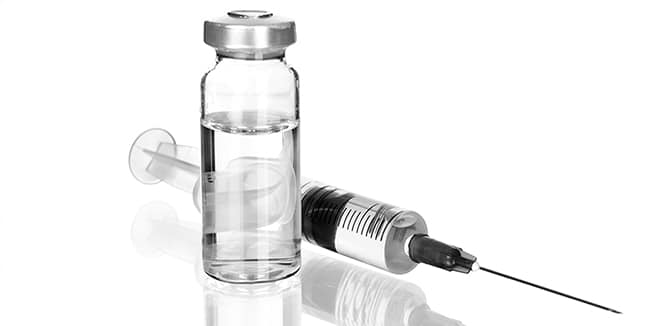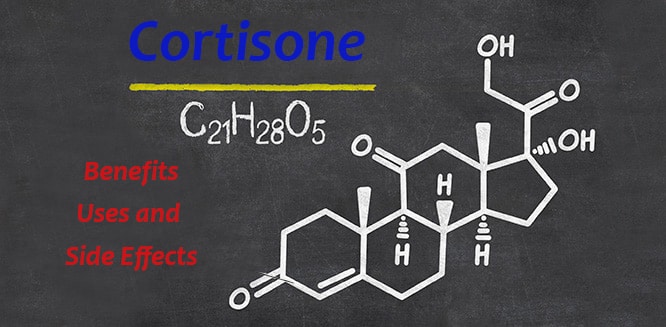Cortisone is an anti-allergic, immunosuppressive and anti-inflammatory hormone in the corticosteroid class. It can be used in the treatment of many serious disorders. It is especially useful in controlling asthma and allergy attacks. Cortisone-containing drugs are used in the treatment of important diseases such as skin disorders, ulcerative colitis, psoriasis, eczema, arthritis and allergic disorders. Cortisone, which is effective in the treatment of most inflammatory diseases, is also life-saving in the fight against cancer. However, overdose or misuse of drugs may cause the patient to experience extremely serious side effects. Therefore, patients who use cortisone should be careful.
Table of Contents
What is Cortisone?
Cortisone is a drug that reduces the inflammatory and allergic responses of diseases affecting immune system. Cortisone drugs that treat many diseases are actually artificial forms of cortisol hormone, a hormone secreted by adrenal glands in our body. Corticosteroids have a common chemical structure with the anabolic steroids that provide the development of male characteristics.
What is Natural Cortisone?
Natural cortisone, which is responsible for maintaining the balance of fat and carbohydrates, allows the body fat to be mixed into the blood and into sugar. So, this hormone ensures that the body’s energy needs are met. Cortisone hormone leads to the production of antibodies that help the body fight against diseases and infections. Natural cortisone mediates the strengthening of the immune system and defense mechanism.
Inadequate secretion of the cortisol hormone by the body can cause many health problems such as weakness, fatigue, low body resistance and poor immune system. When stress and other serious discomfort are added to the weaknesses, person can easily be caught to more serious diseases. In fact, patient may also lose his life. In cases where the cortisol hormone is not sufficient, it must be supplemented from the outside.
What is Cortisone Hormone used for?
Cortisol hormone is a hormone that is secreted spontaneously by our body in case of high stress and life threatening condition. Blood pressure and body temperature are effective on the amount of cortisol hormone secreted by the adrenal gland during the day. The hormone cortisol, also called a stress hormone, allows the immune system to fight or escape from this danger when there is stress or life threat.

Synthetic cortisol hormones, such as cortisone medications, relieves pain and inflammation in certain parts of the body. Eliminates the symptoms of inflammation when injected into the joints like the elbow, buttocks, shoulders, knees, and wrist. It is possible to benefit from cortisone in the treatment of diseases such as tendinitis, reactive arthritis, gout and psoriatic arthritis.
Types of Cortisone and Medications
Cortisone drugs; is classified in a different way such as topical creams, pills, drugs injected directly into the body, etc. The most commonly used types of cortisone can be classified as follows:
Cortisone Injection
Cortisone injections are used to treat symptoms such as bursitis, osteoarthritis, isolated joint inflammation, and pain caused by arthritic disorders such as gout.
WARNING: You may experience redness and warmth in the area of the cortisone needle. To relieve pains after the needle, you can compress with cold/icepack to this area. Stay away from the bathtub and jacuzzi for 2 days after the cortisone injection. But you can take a shower while standing. Protect the area where the needle is made.
For example, if you have a cortisone needle shot in your knee, you should avoid lifting heavy loads for a few days and getting on your shoulders. If pain, swelling and redness are not healed within 2 days, you should see your doctor. As an example Betamethasone and triamcinolone are cortisone drugs injected directly into the inflamed site.
Cortisone pill (Oral drugs)
They are being used during painful exacerbations that are caused by the inflammatory diseases affecting entire body especially rheumatoid arthritis and ankylosing spondylitis. Methotrexate and sulfasalazine are the most commonly used oral cortisone drugs.
WARNING: Before using cortisone pills prescribed for the treatment of arthritis, be sure to tell your doctor about other prescription or over-the-counter medications you use. Do not use your pills in your own judgment without consulting a doctor, do not use these pills for longer or shorter than the prescribed time.
Cortisone creams (topical cortisone)
Topical cortisone drugs with different versions such as cream, spray, foam, gel are used in the treatment of inflammatory skin disorders. Hydrocortisone cream, particularly used in treatment of insect bites, can be shown as examples of topical cortisones. For treatment of psoriasis, which is an inflammatory skin disorder and often associated with psoriatic arthritis, topical cortisone can be used only on inflammatory lesion on skin.
https://www.healthandmedicine.net/what-is-psoriasis-symptoms-causes-and-treatment/
Why are Cortisone Drugs used for?
The cortisone drugs are especially useful in the treatment of different types of arthritis. Cortisone topical creams and ointments are prescribed for inflammatory skin conditions such as psoriasis and lupus. Drugs with cortisone are activated when a small amount of cortisone is secreted by the adrenal gland.
In addition to reducing inflammation and swelling in the body, they prevent the release of molecules that cause inflammation. Allergic reactions such as seasonal allergies, ulcerative colitis, anemia; can be treated with the use of drugs with cortisone.
Which diseases does cortisone used for treatment?
Cortisone, which is mostly used in the treatment of arthritis and inflammatory skin disorders, is often used in the treatment of the following diseases.
- Asthma and allergic disorders
- Psoriasis, Eczema
- Gout
- Adrenal insufficiency, Anemia
- Many types of arthritis such as romataid arthritis and osteoarthritis
- Cancer, ulcerative colitis
- Tendinitis, Lupus
- Joint and tendon inflammations
How is Cortisone treatment applied?
Cortisone treatment varies depending on the type of the disease to be treated and the method of treatment with cortisone. In treatment with a cortisone pill, you should consume these pills a few times a day during the time prescribed by the doctor.
For topical treatments, you should apply cortisone cream or ointment to the inflamed lesion in the skin, 2-3 times a day and in a thin layer.
Cortisone treatment by injection, is usually relieves symptoms for a period of 6 weeks to 6 months caused by inflammation, such as pain, etc. When the effects of the injection is over, it may be necessary to treat the person again with a cortisone injection.
Even the treatment with the injection may continue for life. Cortisone injection may be administered to the muscles, joints, blood, spine, and area around tendon. In order to prevent the patient from feeling pain, the injection can be performed with local anesthesia.
Treatment with the injection often does not eliminate the disease itself. In other words, only symptoms can be eliminated by treatment. Patients with asthma may need to receive cortisone treatment for life, just like patients with rheumatoid arthritis.
Does Cortisone Treatment dangerous?
Cortisone treatment can be very dangerous if it is continued for a long period of time or if the treatment is done with a high dose. However, for short-term treatments, the patient usually does not experience serious side effects. Keeping treatment as short as possible and at a low dose is important for the overall health of the patient.
What are the side effects of cortisone?
- Metabolism: Cortisones, which raises blood glucose levels, can be dangerous especially for diabetics. Causing the increase in lipid levels of blood can lead to an increase in cholesterol levels. Vascular occlusion; it is especially common in people who use cigarettes and birth control pills.
- Cardiovascular: Potassium loss, congestive heart failure, myocardial rupture following hypertension, and myocardial infarction are among cardiovascular risks associated with cortisone use.
- Gastrointestinal: Side effects of gastrointestinal system such as stomach ulcer, potential perforation and bleeding, nausea, gastric perforation, increased appetite, pancreatitis and etc. have been reported. These risks can be minimized by taking drugs on a full stomach.
- Musculoskeletal: muscle weakness, musculoskeletal problems, bone resorption, muscle loss, etc. are the most frequently encountered side effects in the first year of treatment. These side effects are more common in people who are sedentary life and women have had menopause.
- Psychiatric: Side effects can be seen like insomnia, severe depression and anxiety, personality disorders and changes etc..
- Nervous system: The patient may experience side effects associated with the nervous system such as vertigo, headache, fatigue etc. due to the long-term use.
- Skin: Side effects can be seen like chaps in skin, bruising of the skin, delayed wound healing, excessive hair growth, darkening of the skin color, thickening of the neck etc..
- Endocrine: Side effects may occur like suppression of growth in children, pituitary unresponsiveness, cushingoid etc..
- Ocular: It is possible to experience unwanted side effects in the eye such as increased intraocular pressure (glaucoma), especially cataracts in children, etc. In order to prevent the development of cataract and glaucoma, the patient must see a doctor every 6 months.
- Allergic reactions: Individuals may develop severe allergic reactions like skin rash, itching, urticaria, swelling of the face, lips and tongue; making it difficult to breathe. Cortisone therapy may have fatal consequences for people who have had an allergic reaction before.
Thromboembolism, menstrual irregularity, sexual reluctance, decrease in the amount of sperm in men are rarely reported side effects.
WARNING: Cortisones, which significantly suppress immune system, can cause person to be more easily infected. In addition, patients may experience their illness more severe. In pregnant women it may increase risk of high blood pressure and blood glucose levels in the mothers.
Cortisone use in a period close to the delivery may suppress the adrenal glands of the baby. Therefore, pregnant women shouldn’t use cortisone pills without consulting a doctor.
Side Effects of Cortisone Injections
- Nerve damage
- Infection in joints
- Soft tissue thinning at the injection site
- Temporary inflammation and pain in the joints
- Decrease in Bone Density and Sarcopenia
- Temporary increase in blood glucose levels
- Weakening of Tendon tissue
How to remove the negative effects of cortisone?
In order not to be exposed to the side effects of cortisone injections or pills, you should exercise regularly, abandon your bad and unbalanced eating habits, attend your appointments with your doctor periodically, and reach your ideal weight by losing weight.
You should not forget that cortisone treatment can cause fatal risks, and if you experience side effects, you should immediately inform your doctor about any side affects you have experienced. In this case, your doctor may decide to terminate cortisone treatment as well as dose reduction in treatment.
Recommendations and warnings about Cortisone
- Leave your smoking habits as soon as possible
- Limit alcohol and caffeine consumption as much as possible
- Eat calcium-rich foods to reduce the risk of bone loss
- Eat protein-rich diet to avoid muscle loss
- Eat a low-fat diet to prevent cholesterol levels from rising
- Avoid solid and saturated fat consumption
- Choose a salt-free diet against the risk of high blood pressure
- Eat carbohydrate-poor foods
- Enter the bone density assessment test (DEXA) once a year
- Adopt an active lifestyle. For this purpose, you can take a 30-minute walk a day, participate in activities such as fitness and aerobics.




